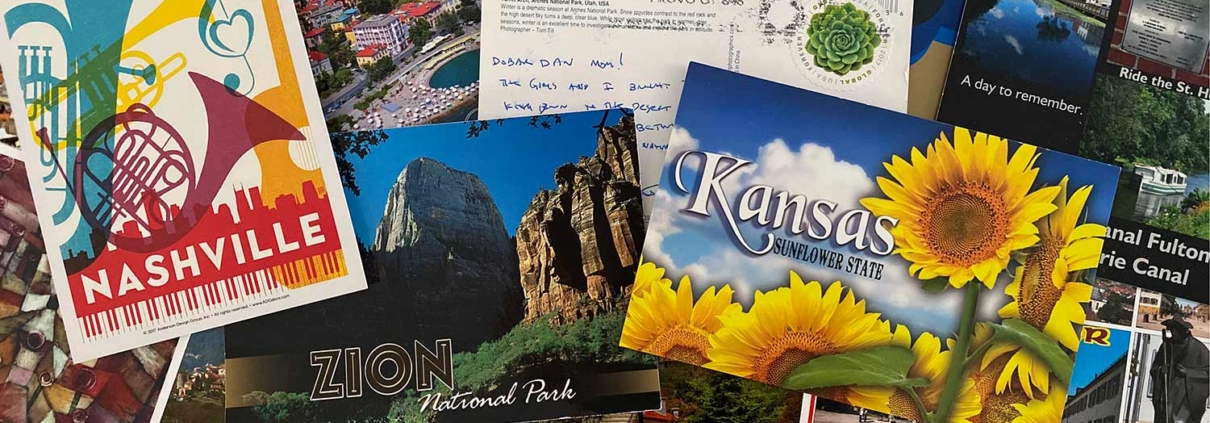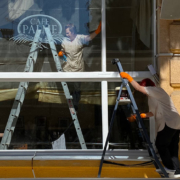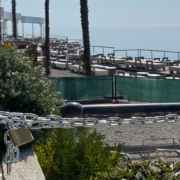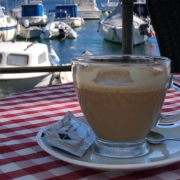Postcards to Croatia
Any time is a good time to reach out to your family and friends just to say, “I’m thinking about you.” But especially now, in light of the coronavirus and the social distancing we’ve all been getting used to, a quick email or postcard to your loved ones, or a letter with a family photo, can help alleviate some of that isolation and take their minds off current events.
For those (like us) who were not lucky enough to grow up speaking more than a few words of Croatian, writing to distant family members can be a bit daunting. Many people in Croatia know English, and all children have mandatory foreign language classes as part of their school curriculum; however, you may have older relatives who only speak Croatian. Normally a neighbor or family member would be happy to help translate, but with the current social restrictions in place, you may want to say a few words they can understand in case nobody is around.
So we’ve put together a few tips and phrases to help! Don’t worry too much about accents and spelling—Croatians understand their language is difficult (many struggle with it themselves) and they will appreciate that you tried!
The first thing to be aware of is that formal greetings are used to open and close a message, regardless of whether it is a letter or even an email. Second, the following phrases are commonly used, so don’t worry if the translation sounds a little clunky to an English speaker.
Dear ___________ [name],
Draga ___________, for a woman (for example, “Draga Ana” means “Dear Ana”)
Dragi ___________, for a man (for example, “Dragi Ivan” means “Dear Ivan”)
Draga obitelji ___________, for a family (for example, “Draga obitelji Kovačević” means “Dear Kovačević family”)
I think about you often.
Često mislim na tebe. (“tebe” refers to one person you are close to)
Često mislim na vas. (“vas” refers to a family, multiple people, or someone you are not as familiar with)
How are you?
Kako si? (to one person, informal)
Kako ste? (to two or more people, or formal)
How is the family?
Kako je cijela obitelj?
I hope you are well.
Nadam se da si dobro. (singular informal)
Nadam se da ste dobro. (singular formal)
Nadam se da ste svi dobro. (plural)
I am well. / We are well.
Ja sam dobro. / Mi smo svi dobro.
I am the daughter / son of ___________ [name].
Ja sam kćerka / sin ___________.
My daughter / My son is ___________ [name].
Moja kćerka / Moj sin je ___________.
My wife / My husband is ___________ [name].
Moja žena / Moj muž je ___________.
I send greetings to you.
Šaljem ti (singular informal) / vam (plural or formal) puno pozdrava.
We send greetings to you.
Šaljemo ti (singular informal) / vam (plural or formal) puno pozdrava.
___________ [name] sends greetings to you.
___________ te (singular informal) / vas (plural or formal) pozdravlja.
My family sends greetings to you.
Moja obitelj vas puno pozdravlja.
This picture is ___________ [name, place].
Na ovoj slici je ___________.
We would like to see Croatia someday.
Voljeli bismo vidjeti Hrvatsku jednog dana.
I hope to visit Croatia soon.
Nadam se da ću uskoro posjetiti Hrvatsku.
We hope to visit Croatia soon.
Nadamo se da ćemo uskoro posjetiti Hrvatsku.
I’m praying for you and the whole family.
Molim se za tebe (singular informal) / vas (plural or formal) i cijelu obitelj.
God bless and keep you.
Neka te (singular informal) / vas (plural or formal) dragi Bog čuva i blagoslovi.
Warm greetings,*
Lijep pozdrav,
Many greetings,*
Puno pozdrava,
*Croatians usually save the word “Love” for romantic relationships. “Greetings” are used for other loved ones.
If it looks like the postal address you have is incomplete, don’t worry. In many villages and smaller towns, there may be no literal street addresses. (In smaller areas, the postman knows where everybody lives anyway!) The format for a complete address is:
Luka Kovačević (addressee’s first and last name)
II Kat (floor or apartment number, if there is one)
Radnička ulica 40 (street name followed by house or building number)
47000 Karlovac (5-digit zip code, followed by village, town, or city name)
Croatia
You can find more detailed addressing examples at the Hrvatska pošta website.
Finally, when you send a note to Croatia, don’t expect a pen pal. Sending letters overseas can be uncomfortable in any language, and you might not hear back. But rest assured, your message will bring joy and appreciation. And chances are, when you finally return to Croatia and visit your relatives in the village, they will open a drawer and pull out a postcard or photo you sent them years before.

 2020 DOMA Trading
2020 DOMA Trading 2020 DOMA Trading
2020 DOMA Trading  2020 DOMA Trading
2020 DOMA Trading  2020 DOMA Trading
2020 DOMA Trading 
 2020 DOMA Trading
2020 DOMA Trading 2020 DOMA Trading
2020 DOMA Trading